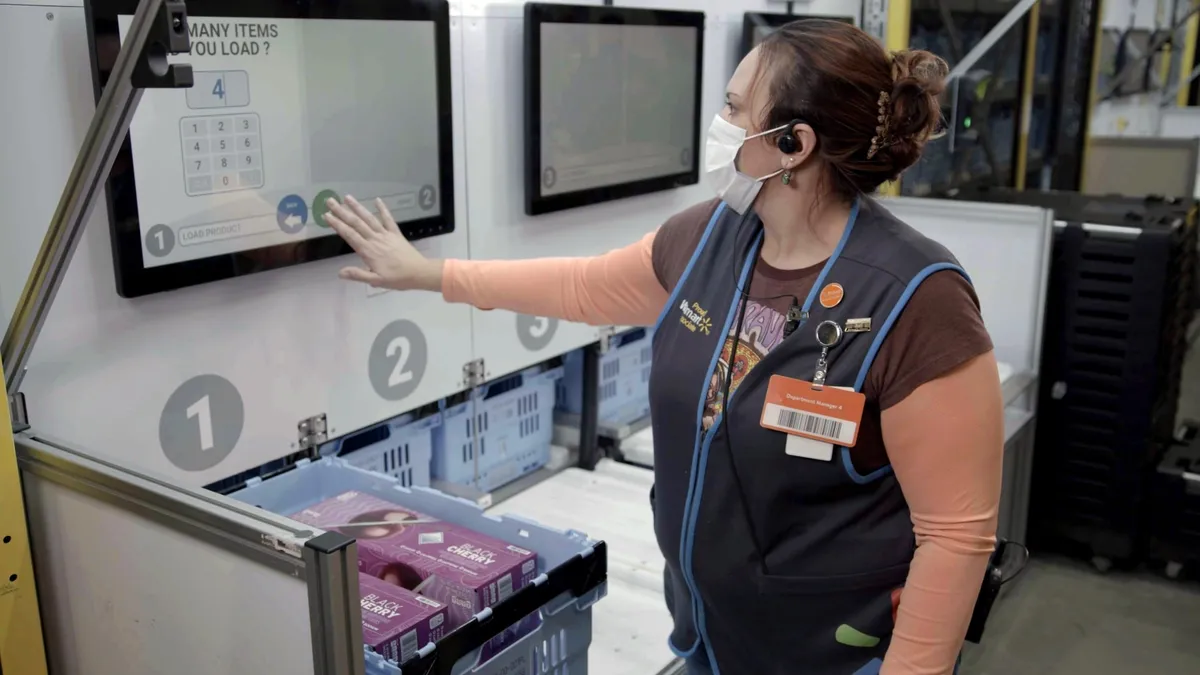Dive Brief:
- Walmart will add automated micro-fulfillment centers to dozens of store locations, according to a company blog post. The company did not provide a timeline for the rollout or indicate where it will introduce the centers.
- The company will test a variety of configurations across multiple tech providers, including Alert Innovation, Dematic and Fabric. Some of Walmart's "local fulfillment centers," for example, will appear in existing store space, while others will be added on to the building.
- Walmart will also add automated drive-thru pickup points at select stores that allow shoppers to drive up, scan a code and collect their order.
Dive Insight:
Walmart's approach to micro-fulfillment allows it to test various options before determining the best way to scale up — a step experts have recommended as retailers determine the ins and outs of the new technology and its numerous providers.
Alert Innovation's approach, for instance, centers on the Alphabot, a robotic picker that moves autonomously inside fulfillment spaces, while Fabric promotes the ability to fit its micro-centers inside areas as small as 5,000 square feet.
"With these partners, we'll be testing different orientations and add-on innovations to understand what works best in different environments," Tom Ward, senior vice president of customer product for Walmart U.S., wrote in the company blog post.
Walmart began testing automated micro-fulfillment in 2019 at a single store in Salem, New Hampshire, with Alert. That facility, along with others it plans to roll out, uses a robotic fulfillment system to store and retrieve products. Human workers assemble the orders and also hand-pick fresh products and large items that won't fit into the system.
Ward indicated that Walmart workers will be responsible for picking these supplemental products from stores, in keeping with its current approach to pickup and delivery.
"We've always said personal shoppers are the secret to our pickup and delivery success, and that remains true. So, while the system retrieves the order for assembly, a personal shopper handpicks fresh items like produce, meat and seafood, and large general merchandise from the sales floor," Ward wrote.
Ward said the automated center in New Hampshire allows Walmart to assemble orders faster, offering pickup or delivery within an hour and creating more availability for shoppers. It has also boosted efficiency, with the ability to fulfill orders for multiple stores.
Walmart executives noted in a recent earnings call they plan to expand their micro-fulfillment test to Texas, but did not indicate a scale or timeline for the project.
Automated micro-fulfillment has emerged in recent years as a way for retailers to increase the speed and efficiency of online order fulfillment. As demand for grocery e-commerce has soared during the pandemic, so has the need to make costly picking, packing and delivery operations more economically feasible.
Retailers like Albertsons and Ahold Delhaize have begun testing micro-fulfillment technology, but with its significant scale, resources and technology infrastructure, Walmart is poised to once again set the pace for the industry. The retailer offers pickup from around 3,500 locations and same-day delivery from around 2,700 locations. It offers a membership program, Walmart+, that includes unlimited no-fee delivery. It's also testing driverless delivery — including "middle-mile" delivery between its facilities — that could eventually intersect with automated fulfillment.
John Lert, founder and CEO of Alert Innovation, said Walmart's announcement is a significant step in online fulfillment.
"Walmart's announcement is exciting as it's the largest deployment of automated micro-fulfillment technology announced to date by any retailer and represents a major step in the evolution of local fulfillment," he wrote in a statement to sister publication Grocery Dive.
Walmart's automated pickup announcement, meanwhile, signals another step for the retailer in a technology space it has been testing for years. A graphic included in Walmart's blog post indicates these will be drive-up kiosks that will offer an automated alternative to the retailer's current pickup service, which centers on designated store parking spaces and in-store service. Walmart offers automated pickup towers, which do not hold perishable grocery items, at several hundred stores.
Retailers are eager to innovate in pickup, a service that's emerged as the preferred channel for online shoppers during the pandemic. In December, Albertsons installed an automated pickup kiosk at a Jewel-Osco store in Chicago, while other retailers are scaling pickup lockers and tracking technology that helps stores see when shoppers are coming to gather their orders.

















